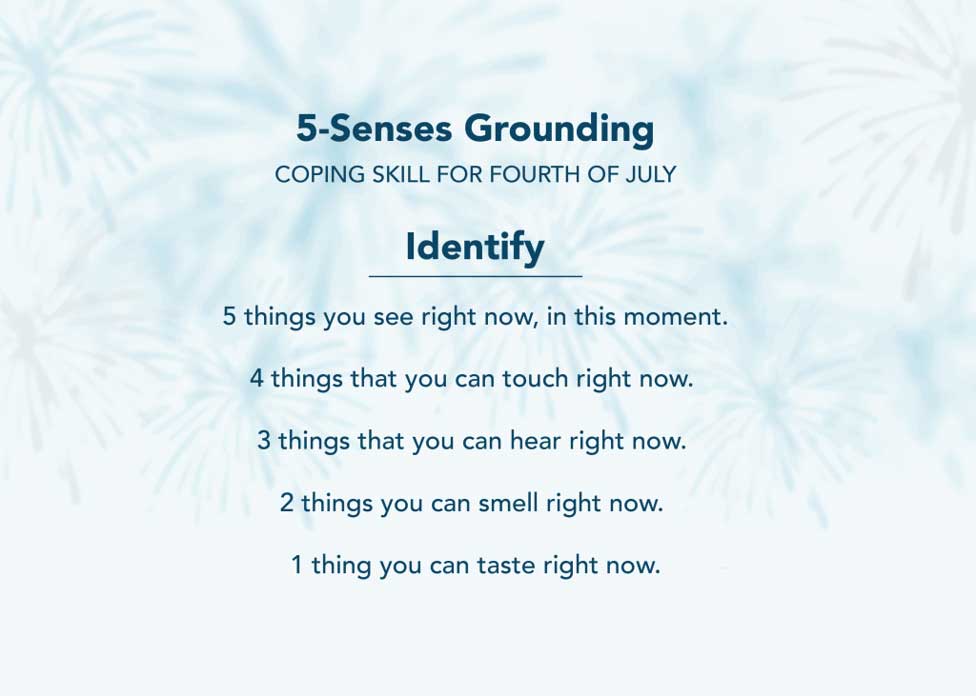Updated to reflect current program offerings. Original article “How to Manage PTSD Symptoms During Fireworks Season” was published on July 3, 2022.
Love them or hate them, fireworks season is upon us, and during peak holidays, like the fourth of July, it is nearly impossible to avoid the bright lights and loud booms.
We spoke with Natalie Gela, Ph.D., Director of the Trauma Program, Compass Health Center – Northbrook, to unpack how individuals with post-traumatic stress disorder (PTSD) or who have experienced trauma can cope with stress associated with fireworks.
What is post-traumatic stress disorder (PTSD)?
Post-traumatic stress disorder (PTSD) can occur after someone has experienced and/or been exposed to a traumatic event or events, directly or indirectly. A diagnosis of PTSD is given when someone has experienced a traumatic event and is experiencing symptoms that fall into four categories, all together, for at least a month: intrusive, re-experiencing symptoms associated with the traumatic event, that have begun since the trauma(s); persistent avoidance of stimuli associated with the traumatic event, that has begun since the trauma(s); significant, negative changes in mood, self-image, thought processes and beliefs that have begun/worsened since the traumatic event(s); significant changes in arousal and reactivity that have begun/worsened since the traumatic event(s). To receive a diagnosis of PTSD these symptoms must be causing significant distress and impairment in important areas of functioning.*
Why do loud noises, like fireworks, trigger PTSD and/or other responses in individuals who have experienced trauma?
People who are struggling with symptoms of posttraumatic stress and/or who have been diagnosed with posttraumatic stress disorder may be very reactive to unexpected stimuli such as loud noises and experience an exaggerated startle response. Furthermore, for individuals whose past trauma experience(s) involve loud noises and/or aerial events/stimuli and/or bright lights, fireworks may act as a trauma-related trigger that represents an aspect of the traumatic event.
What can people do to better prepare for holidays like the 4th of July, especially if fireworks are going to be present?
Identify breathing and grounding skills and plan to use these before, during, and after the fireworks. Put together a grounding kit filled with objects that can be used to self-soothe and remind oneself that they are safe in the here and now, even when their body may not feel safe. Identify a safe place that is calm and private where you can go to take a break, self-soothe, and practice coping skills. Consider ear plugs to buffer some of the noise. Consider sharing your plan for coping with fireworks with your family and friends so that they can support you in carrying this out.
How can evidence-based skills be used to cope with loud noises and bright lights?
Grounding and breathing skills will be the most important in order to help the nervous system tolerate distress and move towards regulation. In addition, practicing self-compassion will be extremely important – when your body/brain reacts as though you are unsafe in the here and now, judging oneself for this (very understandable) reaction will only increase feelings of guilt and shame.
“5-4-3-2-1″ or “5-senses grounding” is a grounding skill that can be done anywhere. Identify five things you see right now, in this moment. Four things that you can touch right now. Three things that you can hear right now. Two things you can smell right now. One thing you can taste right now.

Is there anything else that you think would be helpful for individuals to know about the intersection of loud noises/fireworks and how they may activate responses in individuals who have experienced trauma?
Know that you are not alone in these reactions and that these reactions are not your fault. They are understandable responses given what you have experienced AND you can learn to cope with them in a way that will help you to feel more prepared for these situations and less acutely distressed when they occur.
About Compass’s Trauma Programs
Compass Health Center’s Chicago, Northbrook, and Oak Brook Trauma teams are comprised of passionate clinicians with a commitment to trauma-informed care. Our clinicians exhibit characteristics such as being authentic, present, and supportive while creating a safe space that inspires patients to take a leap of faith in practicing new skills, facing their fears, and finding a way forward.
We meet patients where they are, individualize each person’s treatment, and work collaboratively to empower patients in their healing process. We believe trauma does not define someone. Instead, we give patients the tools they need to move in a direction aligned with their values and goals.
Trauma Program Highlights
Individuals learn psychoeducation about the impacts of trauma, tangible skills to cope with symptoms, and strategies to live a meaningful and value-aligned life. Beyond these core offerings, patients also have the option to work with specialists and receive family therapy, substance use counseling, art therapy, dance movement therapy, trauma-informed yoga, 1:1 skills coaching, and panic management. Program offerings vary by location.
Programs Offered for Young Adults (ages 18-23) and Adults (24+)
Compass Health Center offers Trauma Programs for individuals ages 18 and older at our Chicago, Northbrook, and Oak Brook locations. Our Trauma Programs are unique in their approach to providing our patients with individualized tools to feel empowered as they take on life after Compass.
If you are interested in learning more about our Trauma Programs and the care we provide for adults and young adults, please give us a call. For referring clinicians, you can also find information here about scheduling an intake if you have a patient in need of our care.
* American Psychiatric Association. (2013). Diagnostic and statistical manual of mental disorders (5th ed.). Washington, DC.
-1.png)



